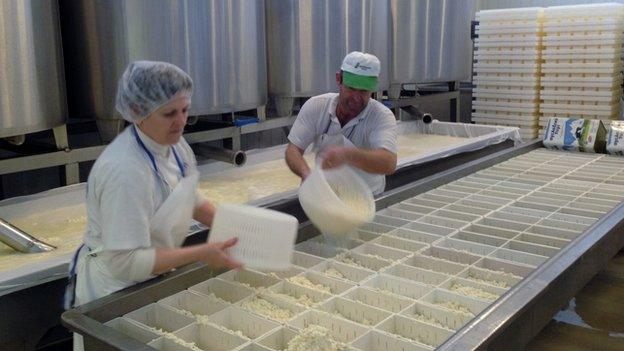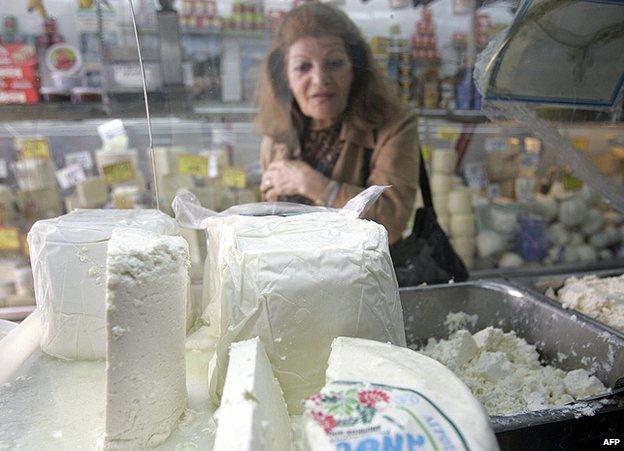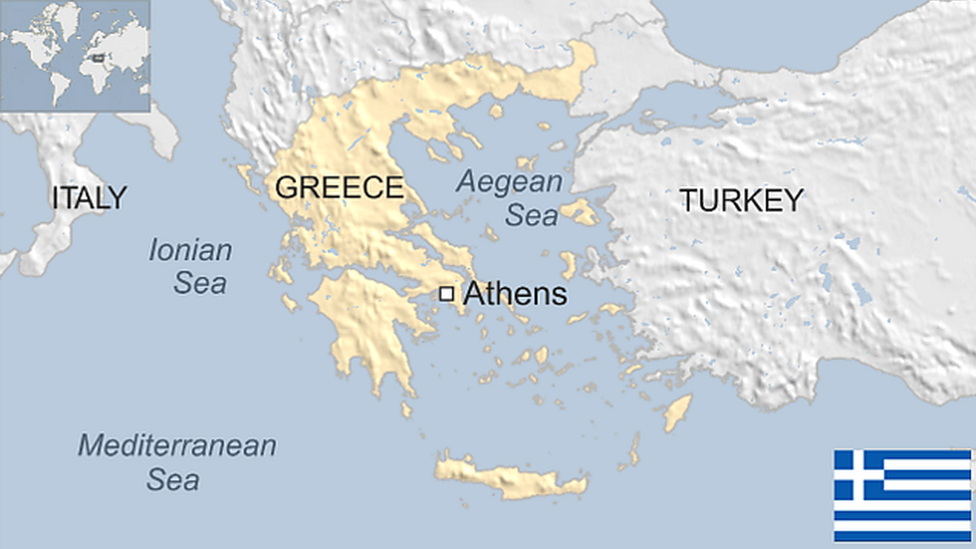Feta cheese row sours EU-Canada trade deal
- Published

Arvanitis is a major exporter of traditional Greek feta
Feta cheese makers and many politicians in Greece feel sour about an EU free trade deal with Canada which they believe threatens the uniqueness of the protected brand.
The status of distinctive European foods is one of the toughest issues in such deals - and the Canada agreement could serve as a model for an even bigger EU trade deal with the US.
Feta is among 145 iconic food and drink names covered by an EU Protected Geographical Indication. The special status prevents other manufacturers in the EU copying the original, traditional product and marketing it like the original.
The list includes many other cheeses such as Italy's Parmesan and Gorgonzola, various hams such as Bayonne (France) and Parma (Italy), and some beers such as Bayerisches (Germany) and Ceske (Czech Republic).
The EU-Canada deal, external, clinched in October after more than four years of hard bargaining, still has to be ratified by the parliaments of all 28 member states, each government and Canada's 10 provinces. So the deal is unlikely to take effect until 2015 at the earliest.
And trouble is maturing in the Greek parliament.
Fight for feta
Feta is a national symbol in the country worst hit by the eurozone crisis, where national pride has taken a battering. A court ruling in 2005 gave Greece a monopoly on the name in the EU.
The white salted cheese, made from sheep's milk or a sheep-and-goat milk blend, matures in brine and its flavour ranges from mild to sharp. Production of genuine feta is restricted to certain parts of Greece - Crete, for example, cannot call its cheese "feta".
The feta industry accounts for more than 70% of Greek cheese exports and - unlike much of the struggling Greek economy - it is expanding. Some 300,000 Greek livestock farmers earn a living from feta.
The leftist Syriza bloc, the main opposition group, rejects the EU-Canada deal.
"A Syriza-led government will veto the agreement," says Thanassis Petrakos, a Syriza MP.
Many analysts expect that Greece will hold snap elections in 2014, and recent polls suggest it will be a close race between Syriza and the ruling conservatives, like the last polls in 2012.
A bipartisan initiative by deputies opposed to the deal has been signed by a third of the 300-member parliament.
Michalis Arvanitis is a feta producer running an export-oriented dairy near Thessaloniki, in northern Greece.
Canada is an important market - and the new deal means not only the removal of import tariffs but also additional safeguards for Greek feta.
But Mr Arvanitis says his genuine feta should not have to compete with Canadian imitators.
"The EU should have fully protected its heritage instead of flouting its own rules to secure a lucrative trade deal," he argues.
"Geographical indications are not a whim - they guarantee quality and preserve traditional recipes and flavours."
Eleftherios Gitsas, deputy chairman of the Greek Association of Livestock Farming, calls it "an onerous deal, a black day for Greece". "It will set a dangerous precedent," he warns.

Feta in Athens - the Greek name has been protected since 2005
Canadian concerns
Canada argues that "feta" is a generic name and under the trade deal Canadian producers can still market their cheese as "feta". In Canada locally made feta dominates the market.
But new Canadian brands of "feta" will have to call their cheese "feta-style" or "imitation feta" and cannot evoke Greece on the label, such as using Greek lettering or an image of ancient Greek columns.
Shepherd Gourmet Dairy is a major Canadian feta producer based in Ontario. Company president Stewart Cardiff says relabeling is not even his top concern.
"The Canadian dairy sector is not among the beneficiaries, because of the opening up of the dairy market to European imports," he says, referring to the provision that European producers will be able to more than double their tariff-free cheese exports to Canada.
For Parma ham, the agreement solves a long-standing dispute. It lifts a 21-year ban, so now genuine Parma ham will be sold under its original name - Prosciutto di Parma - in Canada. But it will have to co-exist with "Parma ham" marketed by Maple Leaf, which registered the trademark in Canada.
As for Parmesan cheese, Italy will have sole rights to the name Parmigiano Reggiano in Canada, though imitation Parmesan can still be labelled "Parmesan" in English and French.
The European Commission sees the trade deal as a big win for Europe's Protected Geographical Indications, external (GIs), which account for 15% of the EU's total food and drink exports.
"For the first time, trademarks and GIs will be able to co-exist," says Commission agriculture spokesperson Roger Waite.
"The deal is a significant improvement on the status quo - not what we wanted originally, but a good compromise."
His optimism is echoed by Leana Pignedoli, a senator for Italy's centre-left Democratic Party, who has long fought for the protection of "Made in Italy" products.
"We are talking about dozens of excellent European products entering the Canadian market, some for the very first time," she says. "European products can win the challenge of competition on their own. They do not need a victory by decree."
- Published28 June 2023
